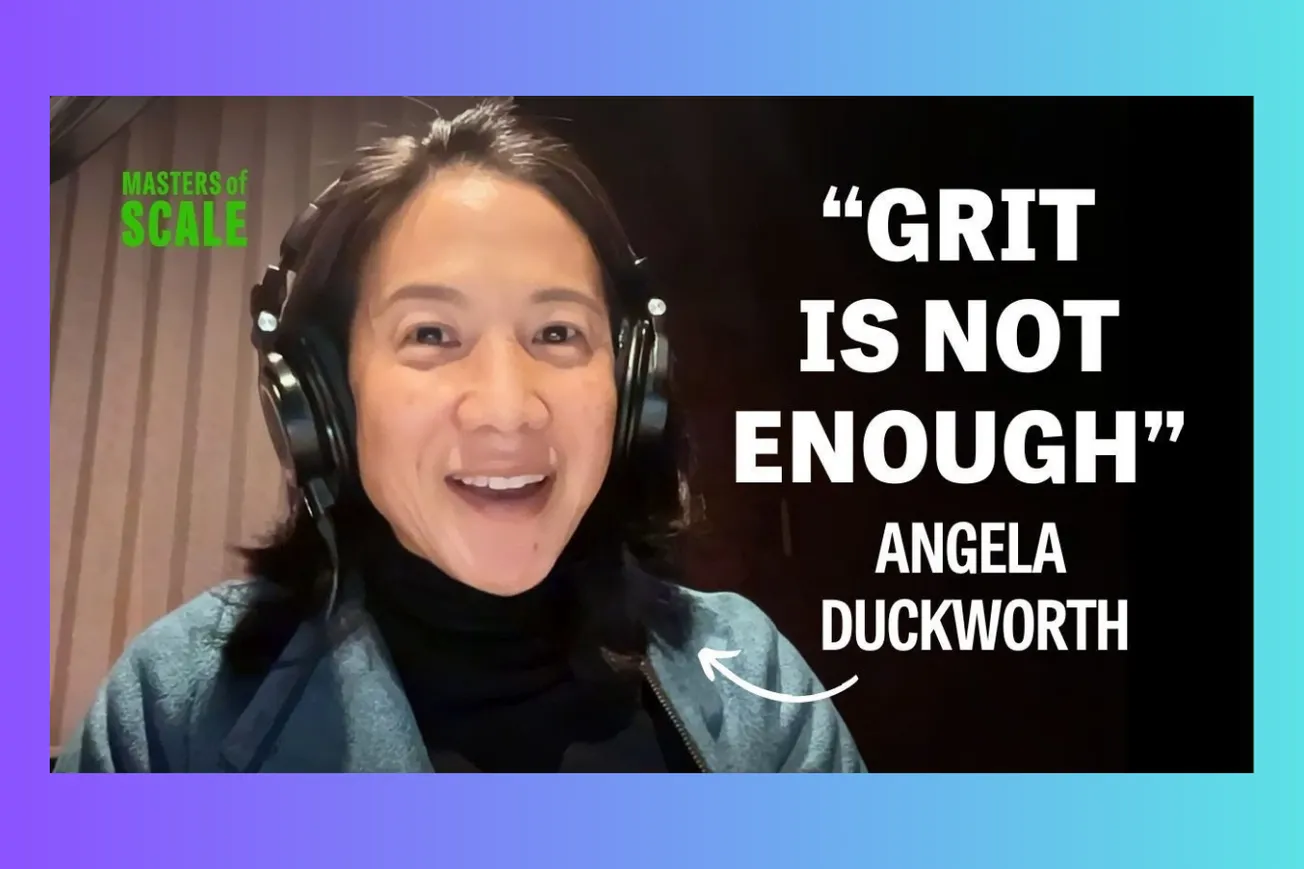Table of Contents
Psychology researcher Angela Duckworth shares insights on career pivots, scaling impact, and building support systems for sustainable success.
Key Takeaways
- Grit combines passion and perseverance, with stamina mattering more than intensity for long-term achievement
- Career pivots often reveal hidden talents when you follow genuine interest over conventional expectations
- High achievers share rare combinations of complementary skills that multiply rather than simply add together
- Academic research can scale massively through clear communication that distills complex ideas into actionable insights
- Success requires both personal determination and strategic situation design, including mentors and peer support systems
- Kids demonstrate remarkable intellectual potential when engaged, but educational environments often fail to unlock it
- The power of words and teaching enables psychologists to impact millions beyond traditional one-on-one therapy models
- Founders need formal communities and proactive mentoring relationships, not just individual grit and independence
From Premed Rebel to Educational Advocate
- Angela's Chinese immigrant parents expected medical school, creating a "cultural destiny" toward becoming a doctor despite her growing passion for education
- Tutoring experiences in Cambridge revealed the vast gap between children's intellectual potential and their actual educational outcomes
- Her father refused to speak with her for six months after she abandoned premed, viewing it as squandering a Harvard education and sacrificing personal dreams for strangers
- The "I'll show you" response became a driving force, turning parental disapproval into motivation to prove education's transformative power
- Working with kids revealed their superior processing speed and pattern recognition abilities, especially when genuinely interested in subject matter
- A devastating classroom encounter where a teacher told an eager student "this is for the smart kids" crystallized her understanding of environmental impact versus natural talent
The McKenzie Detour and Return to Purpose
- After Oxford neuroscience studies, timing misalignment between British academic calendar and American school year led to management consulting opportunity
- McKenzie interviews revealed surprising parallels between business case studies and tutoring algebra, suggesting transferable analytical thinking patterns
- Negotiating pro bono education work proved futile as pharmaceutical and medical device assignments dominated her consulting portfolio
- The stark contrast between luxurious McKenzie lifestyle and harsh realities of New York City public schools provided crucial perspective on systemic challenges
- Teaching seventh grade math to students with second-grade skills highlighted the complexity gap between business problems and educational transformation
- Eleven months at McKenzie served as strategic stepping stone rather than career pivot, maintaining focus on eventual classroom impact
Discovering the Science Behind Excellence
- PhD pivot at age 32 brought clarity about research psychology versus clinical therapy, guided by mentor Marty Seligman's advice about personality fit
- Systematic interviews with Nobel laureates, Grammy winners, and world-class performers revealed consistent patterns beyond talent alone
- The combination of unfakeable passion and extraordinary perseverance emerged as the common denominator across diverse fields of excellence
- Stamina proved more predictive than intensity, with consistency over time mattering more than dramatic bursts of effort
- Jerry Seinfeld's "tonnage" concept validated that sustained engagement trumps sporadic brilliance in creative and professional achievement
- Research confirmed that processing speed peaks at junior prom age, but wisdom and strategic knowledge accumulate throughout adulthood
Scaling Academic Insights Through Public Communication
- Accidental TED Talk opportunity arose through Blue Man Group co-founder's recognition that creativity requires substantial grit
- Six-minute memorized presentation format forced distillation of complex psychological concepts into accessible, actionable insights
- The viral spread occurred organically as coaches, parents, and managers shared the message with teams and families
- William James's century-old "Talks to Teachers" provided philosophical framework for translating academic research into practical wisdom
- Combining psychology expertise with love of words created a rare skillset intersection that enabled unique scaling opportunities
- The superachiever distribution theory explains how complementary talents multiply rather than add, creating exponential rather than linear advantages
Beyond Grit: The Power of Situational Design
- Personal crisis during husband's real estate challenges and her tenure track demands revealed the limitations of pure willpower approaches
- Marriage counseling, family support, mentor guidance, and strategic work restructuring proved essential for sustainable success
- "Grit is not enough; you must have your situation as your ally" represents the evolved understanding beyond individual determination
- Founders particularly struggle with asking for help due to independence mindset that previously enabled their achievements
- Formal peer communities like Y Combinator provide accountability, solidarity, and shared learning that individual effort cannot replicate
- Proactive mentor cultivation requires relationship building skills, not passive waiting for guidance to "fall from heaven"
Common Questions
Q: What exactly is grit and how does it differ from talent?
A: Grit combines passion and perseverance for long-term goals, predicting achievement better than natural ability alone.
Q: Why did Angela leave her McKenzie consulting job so quickly?
A: She used consulting strategically as an eleven-month bridge between Oxford graduation and American school year timing.
Q: How can founders build better support systems beyond individual determination?
A: Join formal peer communities and proactively cultivate mentoring relationships rather than relying solely on personal grit.
Q: What makes some people achieve at extraordinary levels compared to others?
A: Rare combinations of complementary skills that interact and multiply, plus consistent stamina over decades.
Q: How did Angela scale from academic research to mass influence?
A: Combining psychology expertise with communication skills, following William James's model of translating research into practical wisdom.
Angela Duckworth's journey demonstrates that career pivots can reveal unexpected talent combinations when following genuine passion over conventional expectations. Her evolution from reluctant pre-med student to influential public intellectual shows how grit alone isn't sufficient - success requires both personal determination and strategic situation design.





